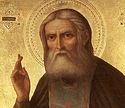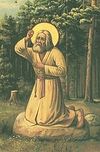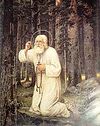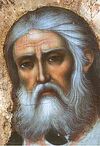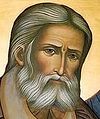

| Previous day | Next day |
| Old Style
January 2
|
Sunday |
New Style
January 15
|
| 31st Sunday after Pentecost. Sunday before the Theophany. Tone 6. | No fast.
|
![]() Forefeast of the Theophany.
Forefeast of the Theophany. ![]() St. Sylvester, pope of Rome (335). Righteous Juliana of Lazarevo (1604).
St. Sylvester, pope of Rome (335). Righteous Juliana of Lazarevo (1604). ![]() Repose (1833)
Repose (1833) ![]() and Second Finding (1991) of the Relics of St. Seraphim, wonderworker of Sarov
and Second Finding (1991) of the Relics of St. Seraphim, wonderworker of Sarov
Hieromartyr Theogenes, bishop of Parium on the Hellespont (ca. 320). St. Sylvester of the Kiev Caves (12th c.).
New Confessor Smaragda, abbess, of Nezhinsk (Ukraine) (1935).
St. Theodota, mother of the first Sts. Cosmas and Damian (3rd c.). Martyr Sergius of Caesarea in Cappadocia (301). St. Ammon, monk of Tabennisi (5th c.). St. Schottin, hermit of Kilkenny, Ireland (6th c.). St. Cosmas, patriarch of Constantinople (1081). New Martyr George (Zorzes) the Georgian, at Mytilene (1770).
Repose of Hieroschemamonk Gabriel of Optina Monastery and Whitehoof Convent (1871), Abbess Thaisia of Leushino (1915), the martyred Elder Ioasaph of St. Tikhon of Kaluga Monastery (1919), and Elder Iakovos of Epirus (1961).
Thoughts for Each Day of the Year
According to the Daily Church Readings from the Word of God
By St. Theophan the Recluse

Sunday Before Theophany[1] (31st). [II Tim. 4:5–8; Mark 1:1–8]
Before the Lord’s appearance to the people, before He began the work of Divine economy[2] of our salvation, Saint John the Forerunner was sent to prepare people for receiving Him. This preparation consisted in a call to repentance. Since then, repentance has become the path to the Lord and Saviour, and the threshold to faith in Him. The Saviour Himself began His preaching with the words: Repent ye, and believe the gospel (Mark 1:15). Repentance and faith lead a person who seeks salvation back and forth between these two states. Repentance weighs him down with the burden of his sins and frightens him with the impartial judgement of God’s righteousness. But faith comes along and shows him the Deliverer Who has taken away the sins of the world. He who repents cleaves to the Deliverer, and laying down the burden of his sins through confession, joyfully runs after Him along the path of His commandments. Faith in this manner is born of repentance and is founded on it. He who repents holds firmly onto faith according to his feeling of deliverance. Faith is alive through repentance. Without repentance faith would be like a sapling which is without an animating current—withered and not giving of life.
[1] Theophany, or in Russian, Bogoyavlenie, means “God has appeared.” This feast day is otherwise known as Epiphany.
[2] Throughout this book, the Russian word, domostroitelstvo, will be translated as “Divine economy,” which refers to God’s stewardship, overseeing our salvation, as a steward oversees a household. The epitome of God’s Divine economy is Christ’s incarnation, and salvation through Him.
Articles
 St Sylvester the Pope of RomeSt Sylvester guided the Roman Church for more than twenty years, earning the esteem of his flock. He died peacefully in old age in the year 335. |
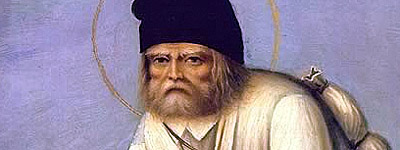 St. Seraphim of Sarov |
 Modern Miracles of St. Seraphim of SarovThe following are true stories sent by readers to the editors of Pravoslavie.ru. |
 Venerable Sylvester of the Kiev Near CavesSaint Sylvester of the Caves lived during the twelfth century and was igumen of the Mikhailovsk Vydubitsk monastery at Kiev. |




